PURPOSE This study aims to develop a coach presenteeism scale with scientifically proven reliability and validity. METHODS In order to achieve the research purpose, preliminary questions were drafted using previous studies (Lee & Kim, 2022) and existing presentation questionnaires (SPS-34, SPS-6, SPS-13). The preliminary set of questions was composed of 23 questions, which were deliberated through a meeting with subject experts. After which, a survey involving 183 coaches was conducted. In this study, statistical verification procedures were conducted through construct validation, exploratory factor analysis, confirmatory factor analysis, internal consistency analysis, convergent validation and discriminant validation. RESULTS Finally, a 2-factor (DRA 5 items, DTP 5 items), 10-item coach presenteeism scale was developed. CONCLUSIONS In this study, a scale with verified reliability and validity was developed to support and investigate the presenteeism phenomenon experienced by coaches. These may be used by coaches themselves to check their presenteeism status and may guide future research to effectively train athletes.
Purpose The purpose of this study was to develop the Emotional Intelligence Scale in Sport Coaching(EISSC) based on the emotional intelligence trait model. Methods The participants were 236 professional sports coaches by the purposive sampling methods via e-mails. 48 preliminary items were developed by literature review among expert panels. Then, a total of 40 items were selected after the item-analysis. Exploratory factor analysis was conducted for construct validity and criterion validity was evaluated by Person’s correlation with coaching efficacy scale and general emotional intelligence scale. An internal consistency, Cronbach's alpha coefficient, was used to see the reliability. Results The results of exploratory factor analysis presented a six sub-structure factors (Self-awareness, Awareness of others, Optimism, Utilization of emotion, Emotion regulation, Social skills) with 20 items, which explained 68.49% of the total variance. Criterion-related validity was supported by correlations with in coaching efficacy(r=.713) and general emotional intelligence(r=.647). Reliabilities were secured with Cronbach’s alpha coefficient .854 for the total 20 items. Conclusions The EISSC can be used to provide an valid measure of emotional ability of coaches in sport.
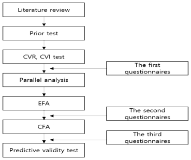
The purpose of this study was to develop an instrument that measures participantsʼ satisfaction in sports instructor training programs. The instrument development process includes focus group interviews, parallel analysis, and validity and reliability tests. Data were collected from 897 participants from three regular training sessions and were analyzed primarily using SPSS and MPlus software. The results indicated that the service satisfaction of sport instructor programs has an underlying three sub-factors, including ʻadministrative supportʼ, ʻcurriculum contentsʼ, and ʻlearning environmentʼ. This study can provide helpful information to managers in improving their respective sport instructor training programs.

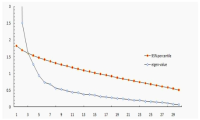

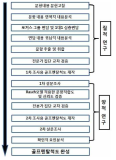
The purpose of present study is to develop the'Golf Mental Scale'that measures and assesses golf players' cognitive, emotional, behavioral response per golf mental factor experienced while competing in depth. In order to achieve this research purpose, Researcher collected raw data of golf mental question through literature review and interview with 8 members of Korean male national golf team and gathered questions per factor through Deductive-Inductive Content Analysis for the raw data. Then, Researcher conducted first and second questionnaire survey targeting 253 of elite & pro golf players and conducted Rasch Model and Confirmatory Factor Analysis for the data collected using SPSS 21.0, Winsteps Ver. 3.65 Program, AMOS 18. The conclusion reasoned out through these research process was as follows: First, golf players' psychological factor structure identified was revealed as Concentration, Self-confidence, Anxiety and Arousal control, Emotion control, Thought control. Total 37 questions were determined. Second, 5 point scale was revealed to be a good fit for Golf Mental Scale. Third, the result of Construct Validity Verification of CFA showed that Golf Mental Scale model was a good fit. Fourth, Reliability of Golf Mental Scale showed high level by recording Cronbach' α value .936. Fifth, Internal Consistency of Convergent Validity and Discriminant Validity was revealed to be satisfied. Eventually, Golf Mental Scale is expected to be used practically as a functional test tool that provides participant's response toward each situation-specific questions concretely and an objective evaluation of participant's golf mental ability per factor considering questions'level of difficulty and participants'characteristic.

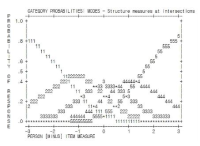
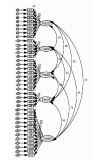
Purpose Recently, studies associated with the negative physical and mental effects of athletes’ pain have received extensive attention. This study confirmed the validity of the pain catastrophizing scale (PCS) developed in clinical settings and is widely used in the sports field, and examined their relationship between the perceived stress levels and fear of pain. Methods The pain catastrophizing consisted of 13 items of three factors which are Helplessness (6 items), Rumination(4 items), Magnification(3 items). To verify the validity, PSC was revised by following the recommended revision guideline procedures. To test the validation of pain catastrophizing, 206 adult athletes were recruited including the collegiate, professional, and national levels. The participants were instructed to complete questionnaires to assess the level of pain catastrophizing, perceived stress, and fear of pain. Confirmatory factor analysis (CFA) to test the fit of measurement model was adopted to examine three higher-order three-factor measurement models. Results In results, confirmatory factor analysis indicated that the Korean version of the pain catastrophizing scale demonstrated a good model fit of measurement when removing one item with a significantly lower factor load as well as the reliability of the scale was reasonable. The pain catastrophizing had a meaningful positive direct relation with perceived stress level and fear of severe pain. In addition, construct validity and predictive validity of PCS showed valid. Conclusions Based on the results of this study, the Korean sports pain catastrophizing scale can be used to measure the subjective pain intensity of Korean athletes. In addition, it is expected to provide fundamental information for evaluating athletes’ post-injury rehabilitation processes.
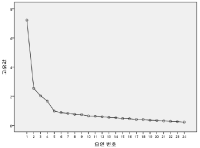
Purpose The purpose of this study was to develop the sport 5C scale of the Korean version. Methods The participants were 772 high school students from 17 to 19 who participated in sport regularly. The validation of Sport K-5C followed a three-step validation procedure through substantive stage, structural stage, and external stage. Results First, In the substantive stage, Sport K-5C consisted of 50 items with 5 factors. Second, in the structural stage, although Sport K-5C was explored as 24 items with 4 factors by EFA, but as a result of CFA, Sport K-5C was confirmed as 24 items with 5 factors. Third, the external stage provided additional validity through correlations of tests with other questionnaires which are similar concept and opposite concept, and group differentiation. Conclusions Sport K-5C is composed of 5 factors and 24 items. The factors are Caring, Character, Confidence, Competence, Connection. This scale can be used to provide an objective evaluation of positive development of youth in sport and physical education context.

Purpose The purpose of this study was to develop a Korean Life Skills Scale for Sports (KLSSS) that original version is the LSSS developed by Cronin and Allen (2017). Methods The subjects were 899 middle school and high school students. The measurement tool was used with LSSS. The validation of KLSSS followed a three-stage of validation procedure; substantive stage, structural stage, and external stage. The result is as follows. Results First, In the substantive stage, KLSSS consisted of 47 items with 8 factors. As a result of the item clarity test, it was confirmed that all the items were appropriate. Second, in the structural stage, KLSSS was explored and confirmed as 5 factors and 18 items. Third, in the external stage, KLSSS showed discrimination and convergent validity. Conclusions KLSSS is composed of 5 factors and 18 items. The factors are teamwork (TW), goal setting (GS), time management (TM), social skills (SS), and leadership (LD). This scale can be used to obtain information on life skills in school physical education or sports.
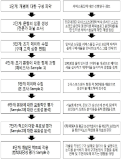
The purpose of this study was (a)to clearly define the concept of service quality as it relates to the online sports shopping mall, and (b)to develop and validate a psychometrically sound measurement scale, (c)examine the relationship among service quality and shopping satisfaction and intention of recommendation for marketing strategy internet sport shopping mall management. Following Churchill’s(1979) suggestions, the author developed internet Sports Shopping Mall Service Quality(E-SSMSQ). For the development E-SSMSQ (1)literature review, (2)focus group interview, (3)in-depth interviews (4)pilot test(n=97), (5)first data collected(n=459), (6)Frequency analysis, descriptive analysis, exploratory factor analysis(EFA) and reliability analysis for items evaluation, (7)confirmatory factor analysis(CFA) and correlation analysis for scale validation, (8)CFA, correlation analysis and structural equation model(SEM) test for predictive validity used second data collected(n=471). The current study conceptualized the service quality in the context E-SSMSQ by incorporating interaction, efficiency, order processing, information, security, and design. The authors also developed 20 items E-SSMSQ. The results of SEM support the psychometric property of the scale. First, interaction, efficiency and order processing of E-SSMSQ had significantly influence on internet shopping mall satisfaction. Interaction, efficiency, security, and design of E-SSMSQ had significantly influence on internet shopping mall intention of recommendation.

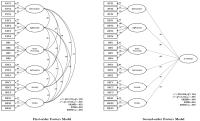
PURPOSE This study both validated the Characteristics of Resilience in Sports Teams Inventory (CREST) scale for use in Korean sports and analyzed the impact of team resilience on teamwork and performance. METHODS The study surveyed 462 elite football players by using the CREST scale to measure team resilience in Korean sports. Data were analyzed using descriptive statistics, exploratory factor analysis (EFA), reliability analysis, correlation analysis, multiple regression analysis, and confirmatory factor analysis (CFA). RESULTS First, results confirmed that the CREST scale’s two main factors—resilient characteristics and vulnerabilities under pressure—can be meaningfully applied in the Korean context. Second, resilient characteristics showed positive correlation with life skills, whereas vulnerabilities under pressure showed negative correlation. Third, resilient characteristics positively predicted life skills, whereas vulnerabilities under pressure negatively affected life skills. CONCLUSIONS The CREST scale was found reliable and valid in the Korean sports context, demonstrating that team resilience significantly impacts life skills. Thus, the study contributes to evaluation of resilience in Korean sports teams and provides strategicinsights to improve team performance.
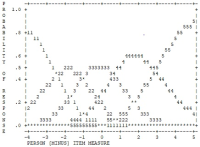
Purpose The purpose of this study was to determine item goodness-of-fit and the optimal categorization of an instrument measuring Korean elite young soccer player’s self-esteem using a two-facets Rasch model (item parameters and person parameters). Methods 10-item Rosenberg Self-Esteem Scale (RSES) with five response categories was administered to 366 elite young soccer players from the Korea football association. The Rasch analysis was conducted by WINSTEPS 3.65. Results First, the model fit the data well. Second, 5-category rating scale did function well. Third, a item-person map illustrated the distribution of RSES items and person’s level of self-esteem. Fourth, the separation reliability of the items and person was shown to be an acceptable degree of confidence, respectively. Lastly, there was statistically significant difference in self-esteem between starting players and bench players, which supported the known-difference evidence of validity. Conclusion These findings provided additional support for the suitability of the RSES in assessing self-esteem of Korean elite young soccer players.


